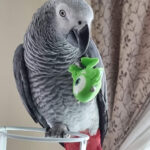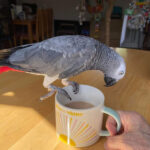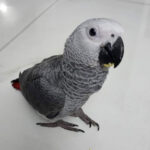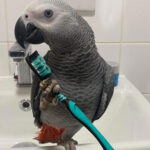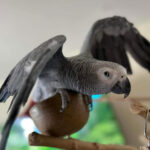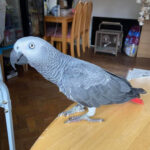- By chestergrey
- In Uncategorized
African Parrots and pelletsAfrican
Parrots and pellets
Pellets which are a formulated diet are considered a better choice for many than seeds.
Pretty Bird produces a pellet exclusively for African greys’ and Harrisons organic pellets are also suitable for greys’.
My greys’ cannot be persuaded to eat Pretty Bird although a colleague’s Grey, Monty thrives upon them.
It is generally possible to convert a seed eater to a pellet eater however it’s much easier to wean a young parrot onto pellets.
What seeds can parrots eat?
Parrots can eat safflower seed, sunflower seed, linseed and a range of other seeds. However, as mentioned, seeds lack micro-nutrients, and shouldn’t form a major part of the diet.
Can African greys’ eat meat and animal protein?
It is controversial whether parrots should be fed animal protein
Wild parrots are presumed to eat insects and grubs both from chewing bark and fruits. My greys’ when young were once offered a cooked chicken drumstick flesh removed, but no longer showed interest when they were mature.
I asked Alan Jones a senior UK vet, now retired, who told me:
“If you are asking about greys’, yes, certainly they are omnivorous. The Americans have an expression ‘facultative omnivores’ applied to most parrots, meaning that they will eat whatever is available at the time. Certainly, in captivity African grey parrots and other parrots will eat cooked egg, cooked chicken and fish, and cheese. In the wild, parrots will take carrion, fish, grubs and caterpillars, especially when feeding chicks”. Quote obtained December 2020.
I have listened to Alan’s advice in person and from his books and lectures for over twenty years and continue to do so.
Many carers believe animal protein should never be fed. You must make up your mind. Some of us feed eggs. I do myself occasionally provide a hard-boiled egg or a vegetable omelette which I share with the greys’. Some versions of birdy bread contain eggs.
You can create your own mash for African greys’
Sprouting seeds and soaking seeds
A valuable addition to a Grey’s diet, is sprouts, seeds or grains. Both seed and pellet advocates agree the sprouts are beneficial to every parrot species.
Sunflower seeds which are frowned upon as being too full of fat, shed this when sprouted and contain valuable enzymes.
Sprouting seeds or grains isn’t complicated:
You soak the seeds for 24 hours. Then rinse and place in one of the many types of sprouter available. A Kilner jar with a pierced lid will sprout equally well.
Keep the jar tilted and rinse twice a day, letting the sprouter drain.
Keep it in a warm place out of direct sunlight and use when the sprouts have a little tail. This takes two or more days.
As the sprouts can develop mould keep well rinsed and clean, and never use if there’s any odour.
You can also sprout seeds like radishes, broccoli or beans to add to your own salads.
Drinking water for African greys’
Fresh water is essential all the times, so should be changed at least twice a day. Whether you use tap or spring water is a personal choice.
Owners have given anecdotal evidence that a few drops of cider vinegar have helped older birds with arthritis.
How much should you feed an African grey?
My regime is 40% seeds and pellets and 60% fresh food. Which includes a lot of nuts, especially for the active macaws.
I am aware that much current opinion decides 60% should be pellets with 10% seeds on top.
In terms of amount, you should feed around 10% of your bird’s body weight a day.
So a bird weighing 450 grams would receive around 45 grams of food.
How often should I feed my African grey?
Captive parrots are generally fed two or three times a day. How you choose your bird’s mealtimes is a personal decision depending on your lifestyle.
I am an advocate of two meals a day. The breakfast bowl should be removed after thirty minutes with no food left except overnight. After a busy day your Grey will be ready for his supper.
Following this routine means your bird will be keen for his training sessions. He’ll also eat well, and while the food is fresh.
Try keeping branches and chewable toys in the cage, instead of food, which you should be doing anyway, for mental stimulation.
Lactose intolerance
A parrot eating a food with too much lactose in it like ice cream or rich cheese will have a runny diarrhoea.
There are no milk trees in the rain forest nor do parrots breast feed. So, they have never evolved to digest lactose. That said, many parrots appear to love yoghurt or the occasional small piece of cheese. So, the answer would be to avoid products with lactose for complete security.
